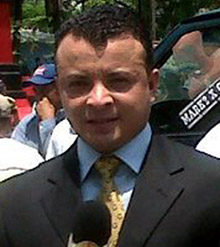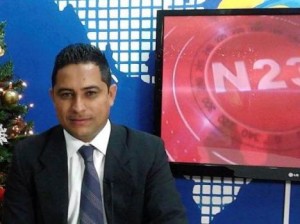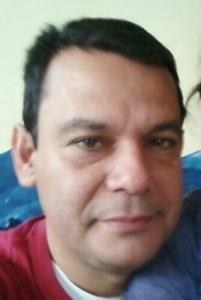Honduras: Three more journalists murdered in the space of a month
by PEN International / October 7, 2014 / No comments
10 September 2014
PEN International is shocked by the recent murders of three more journalists in Honduras – Herlyn Iván Espinal Martínez, Nery Francisco Soto Torres and Dagoberto Díaz Suárez (killed 20 July, 14 August and 23 August respectively), which bring to six the death toll for journalists since President Juan Orlando Hernández took office in January 2014. All six were killed in a three-month period between May and August. At least 44 journalists have been killed since 2003 – 38 since the coup d’état in June 2009 – yet more than 90 per cent of these murders remain unsolved.
PEN International condemns this staggering violence and impunity and calls on the Honduran authorities to do everything in their power to safeguard all journalists working in the country. The state must carry out a prompt and thorough investigation into these and all murders of journalists and ensure that all those responsible – including those who order the killings – are brought to justice. It must develop as a matter of urgency specialised protocols to ensure that any possible links between journalists’ deaths and their professional work are promptly and fully investigated. It should also expedite the approval of a law to create a journalist protection mechanism which is currently before Congress, taking into account civil society concerns, and ensuring adequate resources for meaningful implementation.
On 21 July 2014, the body of Herlyn Iván Espinal Martínez, journalist and news co-ordinator for Televicentro’s news programme ‘Hoy Mismo,’ was found dumped in a ditch along the road between El Olivar and La Danta, Yoro department, northern Honduras. Forensics reports indicate that Espinal was shot five times – receiving wounds to his arm, torso, neck and a fatal shot to the back of the head – and had been killed some 24 hours prior to being found.
The exact circumstances of Espinal’s disappearance remain unclear as there are several conflicting versions of events. However, media reports indicate that he was last seen leaving a bar with friends in the early hours of 20 July. The authorities were quick to act after family members reported Espinal missing on 21 July; his body was located the same day following a search by police and family members.
However, PEN is concerned by reports that investigators ruled out Espinal’s work as a journalist as a possible motive within 24 hours of his body being found. In a statement, Security Minister Arturo Corrales attributed the murder to a crime of passion or an inheritance dispute. On 23 July, the authorities reportedly arrested a suspect who was in possession of the T-shirt Espinal was wearing on the night of his disappearance and the gun used to shoot him. The man is reported to have claimed his innocence. According to Radio HRN, as of 25 July, four people had been arrested in connection with Espinal’s murder.
Prior to working as a correspondent for ‘Hoy Mismo’, Espinal reportedly belonged to the La Fragua theatre company and was a correspondent for Radio Progreso, organisations founded by the Jesuits in the municipality of El Progreso, Yoro.
Just three weeks after Espinal’s murder, Yoro department lost another journalist when on 14 August Nery Francisco Soto Torres, news anchor for Canal 23 and co-producer of the programme ‘Cuarto Poder’ for Radio Full FM, was shot dead outside his home in Olanchito. Again, local authorities in charge of investigating Soto’s murder have ruled out links his work as a journalist as a possible motive as well as robbery, according to news reports. On 25 August, a suspect was arrested in connection with Soto’s murder and several other crimes in the Valle de Aguán region, including the murder of two policemen. The authorities did not provide details of a possible motive for the crime.
A well-respected journalist, as recently as May this year Soto was awarded the ‘Revelación del Año’ (Revelation of the Year) prize in Olanchito in recognition of his outstanding work as a journalist within the municipality. He had covered a number of issues for Canal 23, including the widespread and frequent power outages in Olanchito, a sensitive topic among government officials and electricity providers alike. While there has been some speculation that his coverage of the power outages could have been motive for murder, coverage of this issue is reportedly common in the region. Some reports have also suggested a case of mistaken identity, theorising that Soto’s killers mistook him for another local journalist during the blackout that occurred at the time of his murder.
Soto is the third media worker to be killed in Yoro this year. On 11 April 2014, Carlos Hilario Mejía Orellana, head of marketing for Radio Progreso, was stabbed to death at his home. His murder remains unsolved.
Yoro department has also been the site of a major corruption scandal in recent months. Late July saw the arrest of the mayor of Yoro municipality, the departmental capital, and some of his family members for drugs trafficking, money laundering, kidnapping and allegedly ordering the murder of 137 people, further proof of the pervasive infiltration of the Honduran state by organised crime and drug trafficking.
Nine days after Soto’s death, the owner of local television station Canal 20, Dagoberto Díaz Suárez, was shot dead by unknown assailants in Danlí, El Paraiso department, eastern Honduras, on 23 August. According to a statement given by the National Force for Inter-Institutional Security (Fuerza Nacional de Seguridad Interinstitucional – Fusina), the nature of his murder has led to investigators treating it as a crime motivated by ‘personal rivalries’.
Díaz’s murder brings the total number of journalists and media owners killed in the department of El Paraiso since 2010 to four. The others are Luis Arturo Mondragón Morazán, manager of Canal 19 and the news programme ‘Teleprensa’ (killed on 14 June 2010); Luis Ernesto Mendoza Cerrato, owner of Macrosistema cable company and Danlí’s Canal 24 (19 May 2011); and Juan Carlos Argeñal Medina, correspondent for Globo TV and owner of Christian station Vida Televisión (7 December 2013).
According to PEN’s information, at least 44 journalists have been killed in Honduras since 2003 – 38 since the coup d’état in June 2009. Over 90 per cent of these murders remain entirely unsolved. Where convictions have been obtained the majority may be considered only partially solved due to the authorities’ failure to prosecute those responsible for ordering the crime. In each instance the authorities have been quick to rule out any link to their work as a journalist, typically placing the blame for such crimes on organised crime or gangs.
However, a recent report by the Honduran NGO Committee for Free Expression (Comité por La Libre Expresión – C-Libre) found that state agents were responsible for 50 per cent of all attacks on freedom of expression and access to information in 2013 where the perpetrator could be identified, the main culprits being police, armed forces and intelligence, government and the public prosecutor’s office. Non-state perpetrators identified did not include members of organised crime or gangs, according to C-Libre’s statistics, despite the Honduran State’s tendency to blame violence against journalists on these groups.
PEN International urges the Honduran authorities to carry out a prompt and thorough investigation into these latest six murders along with all unresolved killings of journalists, and to ensure that all those responsible – including those who order the killings – are brought to justice.
The organisation also calls on them to develop specialised protocols within the public prosecutor’s office for the prompt investigation of crimes against journalists, prioritising any links with their profession, and to ensure adequate resources for implementation.
Finally, it asks the authorities to take into account civil society concerns regarding the draft Law to protect Human Rights Defenders, Journalists, Social Communicators and Legal Practitioners, and to ensure the law is passed with sufficient financial, human and technical resources and expertise for meaningful implementation by all bodies involved.
For further details please contact Tamsin Mitchell at the Writers in Prison Committee London Office: PEN International, Brownlow House, 50-51 High Holborn, London WC1V 6ER Tel: +44 (0) 207 405 0338 Fax +44 (0) 207 405 0339 email: tamsin.mitchell@pen-international.org
Note to editors:
PEN International promotes literature and freedom of expression and is governed by the PEN Charter and the principles it embodies: unhampered transmission of thought within each nation and between all nations. Founded in London in 1921, PEN International – PEN’s Secretariat – connects an international community of writers. It is a forum where writers meet freely to discuss their work; it is also a voice speaking out for writers silenced in their own countries. Through Centres in over 100 countries, PEN operates on five continents. PEN International is a non-political organisation which holds Special Consultative Status at the UN and Associate Status at UNESCO. PEN International is a registered charity in England and Wales with registration number 1117088. www.pen-international.org
This article was originally published by PEN International on September 10, 2014







